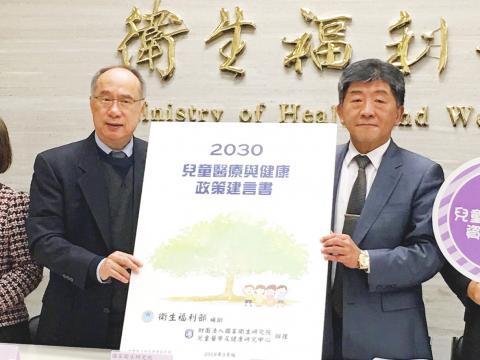The National Health Research Institute yesterday published a white paper on child medicine and health policies, calling on the government to tackle four major issues.
The 700-page white paper outlines policies that the government should address by 2030, and compiles suggestions from more than 200 child health specialists, government officials and non-governmental organizations, the institute’s Child Health Research Center said.
In its last section, the document urges the government to first take measures to reduce child and adolescent mortality rates, lower the child obesity rate, reduce electronic device addiction and substance abuse, and establish an integrated child medicine and health system.

Photo: Lin Hui-chin, Taipei Times
The infant mortality rate in Taiwan is about 4.1 deaths per 1,000 live births, which would rank the nation 27th in the 35-member Organisation for Economic Co-operation and Development (OECD), Institute of Population Sciences director Hsiung Chao (熊昭) said, adding that there is room for improvement.
The rate of newborns with low birth weight — below 2.5kg — increased from 7.6 percent in 2007 to 9 percent in 2015, also placing the nation in the bottom third among OECD members, the paper said.
The child obesity rate in Taiwan was 25.9 percent for boys and 17.4 percent for girls in 2013, and the rates have been increasing, it said.
Electronic device addiction and substance abuse are also among the problems that children and adolescents face, and should be urgently dealt with, the white paper said.
The WHO has recognized the serious and growing problem of digital addiction, classifying video game addiction as a disorder, Hsiung said.
An institute survey of 8,110 students from 169 schools nationwide suggested that the prevalence of video game addiction in children and adolescents (aged 10 to 18) is about 3.1 percent, Hsiung added.
Minister of Health and Welfare Chen Shih-chung (陳時中) said the ministry recognizes the suggestions made in the white paper, and would make more efforts to protect children’s rights and promote proper parenting education.
It would also protect children’s lives by amending and enforcing the law, and by implementing intervention measures, Chen said.
The ministry would also improve the child medicine and health system, Chen added.

Taiwanese can file complaints with the Tourism Administration to report travel agencies if their activities caused termination of a person’s citizenship, Mainland Affairs Council Minister Chiu Chui-cheng (邱垂正) said yesterday, after a podcaster highlighted a case in which a person’s citizenship was canceled for receiving a single-use Chinese passport to enter Russia. The council is aware of incidents in which people who signed up through Chinese travel agencies for tours of Russia were told they could obtain Russian visas and fast-track border clearance, Chiu told reporters on the sidelines of an event in Taipei. However, the travel agencies actually applied

New measures aimed at making Taiwan more attractive to foreign professionals came into effect this month, the National Development Council said yesterday. Among the changes, international students at Taiwanese universities would be able to work in Taiwan without a work permit in the two years after they graduate, explainer materials provided by the council said. In addition, foreign nationals who graduated from one of the world’s top 200 universities within the past five years can also apply for a two-year open work permit. Previously, those graduates would have needed to apply for a work permit using point-based criteria or have a Taiwanese company

The Shilin District Prosecutors’ Office yesterday indicted two Taiwanese and issued a wanted notice for Pete Liu (劉作虎), founder of Shenzhen-based smartphone manufacturer OnePlus Technology Co (萬普拉斯科技), for allegedly contravening the Act Governing Relations Between the People of the Taiwan Area and the Mainland Area (臺灣地區與大陸地區人民關係條例) by poaching 70 engineers in Taiwan. Liu allegedly traveled to Taiwan at the end of 2014 and met with a Taiwanese man surnamed Lin (林) to discuss establishing a mobile software research and development (R&D) team in Taiwan, prosecutors said. Without approval from the government, Lin, following Liu’s instructions, recruited more than 70 software

Taiwanese singer Jay Chou (周杰倫) plans to take to the courts of the Australian Open for the first time as a competitor in the high-stakes 1 Point Slam. The Australian Open yesterday afternoon announced the news on its official Instagram account, welcoming Chou — who celebrates his 47th birthday on Sunday — to the star-studded lineup of the tournament’s signature warm-up event. “From being the King of Mandarin Pop filling stadiums with his music to being Kato from The Green Hornet and now shifting focus to being a dedicated tennis player — welcome @jaychou to the 1 Point Slam and #AusOpen,” the